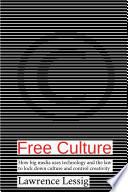
Free Culture (2004)
Context: A simple idea blinds us, and under the cover of darkness, much happens that most of us would reject if any of us looked. So uncritically do we accept the idea of property in ideas that we don't even notice how monstrous it is to deny ideas to a people who are dying without them. So uncritically do we accept the idea of property in culture that we don't even question when the control of that property removes our ability, as a people, to develop our culture democratically. Blindness becomes our common sense. And the challenge for anyone who would reclaim the right to cultivate our culture is to find a way to make this common sense open its eyes.
So far, common sense sleeps. There is no revolt. Common sense does not yet see what there could be to revolt about.
